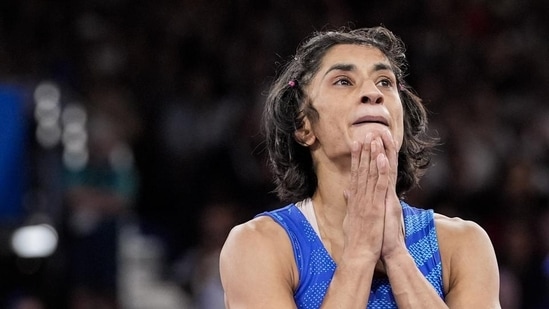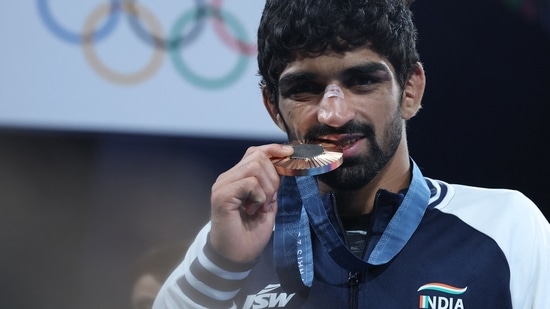
Vinesh Phogat missed the chance to bag gold by 100 gms: How athletes rapidly lose weight overnight and why it’s risky
7 months ago | 83 Views
Vinesh Phogat was the first Indian wrestler to advance to the finals in the Olympics. The dream was shattered by a meagre 100 gms, as inconsequential as the weight of a deck of playing cards or a pair of socks. Vinesh Phogat was disqualified for being overweight by 100 gms just before competing for the gold medal in the 50kg freestyle wrestling category finals. She and her team resorted to relentless attempts to lose weight overnight to lose the necessary weight, undergoing extreme weight-cutting techniques like pumping out blood and cutting hair, but only 100 gms derailed all her hopes. This is not the first case for the star wrestler. In the 2016 Rio Olympics, she was disqualified from overweighing in the qualifying event for exceeding the 48 kg limit by 400 gms.

This is very common in sports with weight categories, like wrestling and boxing, where weights as trivial as a packet of coriander or a bar of soap dash the dreams of athletes and an entire nation rooting for them. This requires extreme weight-cutting measures. Mary Kom was overweight by a few kilos in a tournament in Poland for her 48 kg category and overnight managed to shed 2 kilos within 4 hours. Aman Sehrawat, who bagged a bronze at the Paris Olympics in men's 57kg freestyle wrestling category, shed 4.5 kilos within 10 hours, before his next day’s weigh-in.
Gruelling measures
Weight-cutting is a technique where athletes rapidly shed weight within a brief timeframe. It is a common practice in sports with a strict weight limit, especially in the Olympics. Other than restricting meals, it also involves getting rid of the fluid and water content in the body. On the morning of these sports tournaments, the athletes are weighed to see if they fit within the weight criteria. Disqualification is imminent if they weigh over the designated weight limit. To fit into the weight criteria, athletes embark on a tumultuous weight loss journey weeks before the tournament, to drop at least 10 percent of their body mass. The final 24 hours before weigh-in are particularly harrowing, with athletes skipping meals and fluids to drop those final grams.
Weeks before the tournament, they ditch carbs like roti, and rice and move to salads, creating a calorie deficit to lose weight. It’s a combination of diet, training, and rigorous workouts. As they inch closer to the tournament, the diet dips and the athletes skip meals and train on empty stomachs. Fluid intake is also monitored weeks prior.
On the final day, athletes typically remain just 1 to 1.5 kilos above the weight limit. The last 24 hours are vital, as they've already shed all the weight possible. At this stage, only excess water needs to be eliminated, so they drink as little water as possible. Wrestlers wear heavy hoodies or jackets and train intensely, trying to sweat out the remaining grams. They run in thick sweaters, often in humid conditions. Water intake is nearly stopped as they push themselves to the brink of dehydration. In extreme situations, athletes resort to wearing sauna suits that feel like a furnace, pushing themselves through intense workouts like running or taking scalding hot baths to sweat out the remaining weight. This dehydration is extremely harmful to the body.
Health hazards
The deliberate and prolonged dehydration causes significant health issues. Dehydration imminently causes loss of strength and electrolyte imbalance, dizziness, exhaustion, foggy memory and even fainting. Excessive workouts with no fluid intake lead to hypothermia, when the core body temperature drops. Abnormally high levels of perspiration produced from excessive workouts cool down the body below its normal temperature, leading to heart attacks and kidney failure.
While the entire ordeal is for making it to the competition, it poses a risk to the tournament as well. During the bouts, concentration levels drop, so much so the opponent appears blurry initially. The low water content also causes delayed joint movements in the long term. Cutting weight drastically also leads to renal problems and other organ damage in the long run. The recovery process after a match is far from normal. Athletes face the challenge of rehydrating and restoring their body's water levels to normal. If they're dehydrated, they can't simply gulp down large amounts of water; doing so too quickly can overwhelm the body, leading to vomiting as the body rejects the excess fluid. Other than the physical repercussions, cutting-weight is also mentally detrimental, affecting self-esteem and confidence before the match.
Read Also: Epsom salt for hair: Use this natural remedy to get silky and smooth tresses
#




















